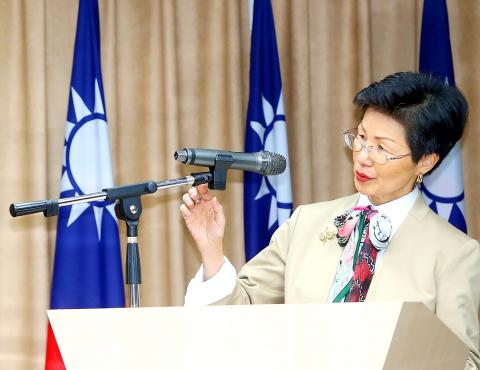Flight safety and national security cannot be compromised, Mainland Affairs Council (MAC) Minister Katharine Chang (張小月) said yesterday, and urged the Chinese government to respect the public opinion in Taiwan and launch negotiations with the government.
Chang made the remarks at the council’s annual year-end news conference in response to China’s unilateral activation of northbound flights on the M503 route earlier this month.
She also presented an annual summary report and explained the council’s goals for this year.

Photo: CNA
The activation of the northbound flights and three extension routes — W121, W122 and W123 — on Jan. 4 affects flight safety and Taiwan’s national security, Chang said.
The Civil Aeronautics Administration’s (CAA) freezing the approval of two Chinese airlines’ application for a total of 176 additional flights during the Lunar New Year holiday is a light response to Beijing’s move and the nation’s high level of constraint has gained public acclaim, she said.
The activation of the route is a cross-strait issue that should go beyond pan-blue and pan-green politics, and the government should not be involved in cross-strait negotiations regarding civil aviation routes, Chang said.
The nation should reach a consensus and refuse to compromise on the issue, she said, adding that the government is urging Beijing to launch negotiations to resolve the conflict as soon as possible.
“The Chinese government has repeatedly said that the activation of the M503 flight route and three extension routes is its internal affair, and has nothing to do with Taiwan’s flight routes and destinations” Chang said. “However, this significantly differs from the reality of cross-strait interactions and we cannot accept this remark.”
Both sides of the Taiwan Strait reached a consensus on the usage of the routes through a civil aviation “mini-cross-strait meeting” in March 2015, so the government is insisting on and executing the policy that was enforced by the former administration, she said, adding that the conflict should technically be negotiated in another meeting, not through politics.
Whether the issue could be resolved in a satisfactory manner would a test to see if the Chinese government respects public opinion in Taiwan, and an important indicator for Taiwanese to estimate the development of cross-strait relations, so Beijing should not underestimate its meaning, Chang said.
Asked about the Chinese government’s suppression of Taiwan in the international community while offering incentives to Taiwanese, she said more challenges in cross-strait relations are expected this year as Beijing continues to neglect official negotiations while increasing civilian interactions.
However, there is a political aim behind China’s offering of incentives to Taiwanese, so the government would review and amend regulations to deal with the situation, Chang added.

Taipei has once again made it to the top 100 in Oxford Economics’ Global Cities Index 2025 report, moving up five places from last year to 60. The annual index, which was published last month, evaluated 1,000 of the most populated metropolises based on five indices — economics, human capital, quality of life, environment and governance. New York maintained its top spot this year, placing first in the economics index thanks to the strength of its vibrant financial industry and economic stability. Taipei ranked 263rd in economics, 44th in human capital, 15th in quality of life, 284th for environment and 75th in governance,

Greenpeace yesterday said that it is to appeal a decision last month by the Taipei High Administrative Court to dismiss its 2021 lawsuit against the Ministry of Economic Affairs over “loose” regulations governing major corporate electricity consumers. The climate-related lawsuit — the first of its kind in Taiwan — sought to require the government to enforce higher green energy thresholds on major corporations to reduce emissions in light of climate change and an uptick in extreme weather. The suit, filed by Greenpeace East Asia, the Environmental Jurists Association and four individual plaintiffs, was dismissed on May 8 following four years of litigation. The

A former officer in China’s People’s Liberation Army (PLA) who witnessed the aftermath of the 1989 Tiananmen Square massacre has warned that Taiwan could face a similar fate if China attempts to unify the country by force. Li Xiaoming (李曉明), who was deployed to Beijing as a junior officer during the crackdown, said Taiwanese people should study the massacre carefully, because it offers a glimpse of what Beijing is willing to do to suppress dissent. “What happened in Tiananmen Square could happen in Taiwan too,” Li told CNA in a May 22 interview, ahead of the massacre’s 36th anniversary. “If Taiwanese students or

The New Taipei City Government would assist relatives of those killed or injured in last month’s car-ramming incident in Sansia District (三峽) to secure compensation, Mayor Hou You-yi (侯友宜) said yesterday, two days after the driver died in a hospital. “The city government will do its best to help the relatives of the car crash incident seek compensation,” Hou said. The mayor also said that the city’s Legal Affairs, Education and Social Welfare departments have established a joint mechanism to “provide coordinated assistance” to victims and their families. Three people were killed and 12 injured when a car plowed into schoolchildren and their